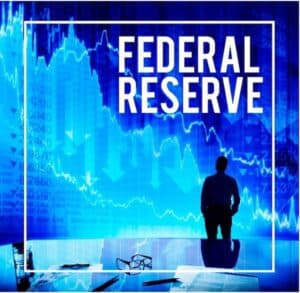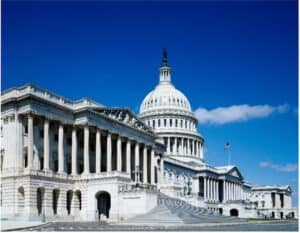
How does Monetary and Fiscal Policy impact me?

How DOES the Federal Reserve Bank and the Government affect the money in your pocket?
Many of us experienced extra funds in our bank accounts during the past few years, thanks to stimulus checks issued in response to the COVID-19 pandemic. The economic relief efforts, including the $1.9 trillion (that’s $1,900,000,000,000 for you to see all the zeros!) stimulus bill passed in 2021, led to unprecedented government spending. Now, in 2024, we are seeing the lasting impacts of those measures, with inflation and a new focus on economic stability driving both government and Federal Reserve actions.
Why are interest rates so high now?
Unlike the rock-bottom interest rates we saw during 2020-2021, in 2024, the Federal Reserve has raised interest rates to combat inflation that surged in the years following the pandemic. This is a direct response to the overheated economy and high consumer prices that began to emerge in 2022-2023. Borrowing has become more expensive, making it tougher to secure loans for homes, cars, businesses, and other financed items.
Supply and demand of money
Money follows the same economic concepts of supply and demand as other commodities. In recent years, the large supply of money led to low interest rates. But now, with the Federal Reserve tightening the money supply, interest rates have gone up. This is a strategic move to curb inflation after a period of high demand and price increases.
Big supply of money? People demand to buy stuff & venders raise prices & interest rates go up
During 2022-2023, inflation reached levels not seen in decades. This was due in part to the massive amounts of money injected into the economy through stimulus spending. When consumers have access to a large supply of money, they tend to demand more goods and services, causing vendors to raise prices. This cycle contributes to inflation, and the Federal Reserve’s response has been to tighten the money supply, bringing interest rates up in 2024.
In contrast, a big supply of LOW-INTEREST money? We get a boom! (e.g., 2020 housing market)
When money is available at low interest rates, as it was during 2020-2021, it stimulates economic activity. We saw this play out with the booming housing market, where historically low mortgage rates made buying homes more affordable. However, by 2024, higher rates have led to a slowdown in sectors that previously benefited from cheap borrowing.
Money follows the same economic concepts
of supply and demand of many other commodities.
Monetary Policy tries to keep the balance
Monetary policy walks a fine line between stimulating the economy and controlling inflation. In 2024, the Federal Reserve is focused on cooling an overheated economy after years of rapid growth and rising prices. It is using contractionary monetary policy—restricting the money supply and raising interest rates—to help control inflation, which surged after pandemic-era stimulus efforts.
What is “the Fed”? It’s the Federal Reserve System (FRS)—our central bank.

Expansionary monetary policy – eases money supply
Expansionary monetary policy, as seen during 2020-2021, is used to expand the economy in difficult times. The Fed increases the money supply and lowers interest rates to encourage borrowing and investment. This was essential during the pandemic to help support economic recovery.
Contractionary monetary policy – restricts money supply (to control inflation)
Now, the Fed is implementing contractionary monetary policy. By reducing the money supply and raising interest rates in 2024, it aims to cool inflation and prevent an overheated economy. This policy shift is crucial to keeping long-term inflation in check after years of stimulus.
How the Federal Reserve Board impacts the Stock Market
The Federal Reserve Board has immense influence over the economy and, by extension, the stock market. In 2024, markets are particularly sensitive to the Fed’s actions and statements as investors try to gauge how interest rate hikes will impact economic growth. The Fed's meetings and comments from the Chair are closely watched, with markets reacting swiftly to any changes in monetary policy.
3 Tools the Fed uses to impact money supply
Tools that the Fed uses to influence money supply include three main strategies:
- CHANGE RESERVE REQUIREMENTS: By adjusting the reserve requirements for banks, the Fed can influence how much money banks can lend. A higher reserve requirement means less money available for loans, which raises interest rates. Conversely, lowering reserve requirements increases the money supply and lowers rates.
- CHANGE THE DISCOUNT RATE: The Fed also controls the discount rate—the interest rate it charges banks. A higher discount rate makes borrowing more expensive, while a lower rate encourages lending.
- BUY & SELL TREASURIES: Through open market operations, the Fed buys or sells U.S. Treasuries. When the Fed buys Treasuries, it increases the money supply, and when it sells them, the money supply decreases. In 2024, the Fed is selling Treasuries to restrict the money supply and combat inflation.
What is Fiscal Policy, and what does it control?

Fiscal policy can stave off economic disaster! Yet, there are also costs—possibly to YOU.
Fiscal policy, when used properly, can prevent recessions and stimulate growth. Expansionary fiscal policy, such as increased government spending and tax cuts, played a major role in preventing economic collapse during the pandemic. However, by 2024, we are seeing the costs of these policies: higher interest rates make saving more difficult, financial bubbles may form in certain markets, and the government’s growing debt could lead to higher taxes in the future.
Navigating policy changes with a fiduciary financial advisor by your side
Navigating today’s monetary and fiscal policy landscape is more challenging than ever. With rising interest rates and inflation concerns, having a fiduciary financial advisor by your side can help you make informed decisions about your financial future. For more information on how we can help you please visit us at www.f5fp.com, or schedule a free consultation here.
Would You Like More Support?
- Do you have a well-defined Investment Policy Strategy that is used to drive your investments in support of a comprehensive financial plan?
- If not, would you like to partner with someone who is used to helping people get through these struggles and (then, with confidence) implement portfolio strategies in a systematic manner while focusing on your desired outcomes?
If so, feel free to send us an email or give us a call. We’d love to have the opportunity to help you find a bit more peace of mind when it comes to investing.
Photo credit: rawpixel.com
F5 Financial
F5 Financial is a fee-only wealth management firm with a holistic approach to financial planning, personal goals, and behavioral change. Through our F5 Process, we provide insight and tailored strategies that inspire and equip our clients to enjoy a life of significance and financial freedom.
F5 Financial provides fee-only financial planning services to Naperville, Plainfield, Bolingbrook, Aurora, Oswego, Geneva, St. Charles, Wheaton, Glen Ellyn, Lisle, Chicago and the surrounding communities; to McDonough, Henry County, Fayette County, Atlanta and the surrounding communities; to Venice, Sarasota, Fort Myers, Port Charlotte, Cape Coral, Osprey, North Port, and the surrounding communities; and nationally.
We'd love to have the opportunity to hear about your situation. Contact us here to schedule an appointment for a consultation.
Learn more about What We Do.
Helping You With
Wealth Preservation – Wealth Enhancement – Wealth Transfer – Wealth Protection – Charitable Giving
